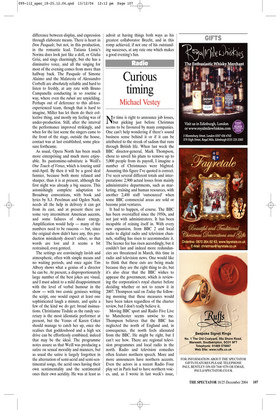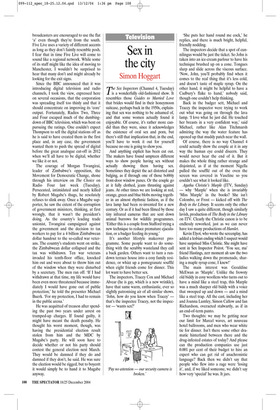Curious timing
Michael Vestey
No time is right to announce job losses, but picking just before Christmas seems to be favoured by many companies. One can’t help wondering if there’s sound business sense behind it or if it can be attributed to the streak of sadism that runs through British life. When last week the BBC director-general, Mark Thompson, chose to unveil his plans to remove up to 5,000 people from its payroll, I imagine a number of Christmases were blighted. Assuming this figure I’ve quoted is correct. I’ve seen several different totals and interpretations: 2,900 actual losses from mainly administrative departments, such as marketing, training and human resources, with another 2,400 staff ‘outsourced’ when some BBC commercial areas are sold or become joint ventures.
It had to happen, of course. The BBC has been overstaffed since the 1950s, and not just with administrators. It has been incapable of reining itself in. With every new expansion, from BBC 2 and local radio to digital radio and television channels, staffing has risen to accommodate it. The licence fee has risen accordingly, but it couldn’t last and indeed more redundancies are threatened in March, this time in radio and television news. One would like to think that these cuts are being made because they are the right thing to do, but it’s also clear that the BBC wishes to appease the government, which is reviewing the corporation’s royal charter before deciding whether or not to renew it in 2007. Thompson said on Today the following morning that these measures would have been taken regardless of the charter review, but I don’t really believe it.
Moving BBC sport and Radio Five Live to Manchester seems unwise to me. Thompson believes that the BBC has neglected the north of England and, in consequence, the north feels alienated from the BBC. He might be right, but I can’t see how. There are regional television programmes and local radio in the north. Radio and television comedies often feature northern speech. More and more announcers have northern accents. Even the actors in a recent Radio Four play set in Paris had to have northern voices, and, as I wrote in last week’s issue, broadcasters are encouraged to use the flat ‘a’ even though they’re from the south. Five Live uses a variety of different accents as long as they don’t faintly resemble posh. I fear that in time Five Live will come to sound like a regional network. While some of its staff might like the idea of moving to Manchester, I wouldn’t be surprised to hear that many don’t and might already be looking for the exit signs.
Since the BBC announced that it was introducing digital television and radio channels, I took the view, expressed here on several occasions, that the corporation was spreading itself too thinly and that it should concentrate on improving its ‘core’ output. Fortunately, Radios Two, Three and Four escaped much of the dumbingdown of BBC television, which was bent on pursuing the ratings. One couldn’t expect Thompson to sell the digital stations off as he is said to have created them in the first place and, in any case, the government wanted them to push the spread of digital before the great analogue cut-off in 2012 when we’ll all have to be digital, whether we like it or not.
The courage of Morgan Tsvangirai, leader of Zimbabwe’s opposition, the Movement for Democratic Change, shone through his interview on The Choice on Radio Four last week (Tuesday). Persecuted, intimidated and nearly killed by Robert Mugabe’s thugs, he resolutely refuses to slink away. Once a Mugabe supporter, he saw the extent of the corruption of government ministers, thinking, at first wrongly, that it wasn’t the president’s doing. As the country’s leading trade unionist, Tsvangirai campaigned against the government and the decision to tax workers to pay for a 4 billion Zimbabwean dollar handout to the so-called war veterans. The country’s students went on strike, the Zimbabwean dollar collapsed and the tax was withdrawn. Ten war veterans invaded his tenth-floor office, knocked him out and were about to throw him out of the window when they were disturbed by a secretary. The men ran off. ‘If I had withdrawn at that time, my life would have been even more threatened because immediately I would have gone out of public protection,’ he told the presenter Michael Buerk. ‘For my protection, I had to remain in the public arena.’ He was acquitted of treason after spending the past two years under arrest on trumped-up charges. If found guilty, it might have meant the death penalty. He thought his worst moment, though, was having the presidential election result stolen from him and the MDC by Mugabe’s party. He will soon have to decide whether or not his party should contest the general election next March. They would be damned if they do and damned if they don’t, he said. He was sure the election would be rigged, but to boycott it would simply be to hand it to Mugabe anyway.


















































































 Previous page
Previous page